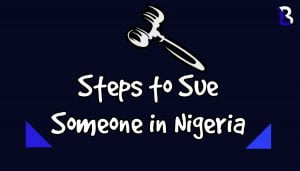If you have been searching the internet to know how to sue someone to court in Nigeria, you are in the right place. In this article, i will comprehensively explain the steps for suing anyone in Nigeria. Coupled with that, I will explain some important tips you need to know about the Nigerian Legal system, that can help to boost your chances of winning a case in Nigeria. As a normal citizen of the country, I understand that many don’t really know these things, and that I why I have decided to share them. I therefore enjoin you to read this article painstakingly so that you will be able to grasp everything contained in it.

A court is a place where legal matters are brought by complainants to be presided on by a magistrate, judge or judges. Determining who will preside over a particular matter depends on the court in which the matter is brought under. If it’s a magistrate court, a magistrate will preside on the matter. But where it is a high Court, a judge (s) presides on the matter. As the cases go on appeal, the appellate courts usually have more judges ranging from three to seven judges.
Also read:
- How to answer law problem questions using IRAC method
- How to apply for law internship in a law firm
- How to become a successful lawyer in Nigeria: 7 qualities you need
- Best Universities To Study Law In Nigeria
What you need to know before suing someone to court in Nigeria
Generally, suing someone is not easy, considering the fact that it requires money. That is, money to pay your lawyer (s) and even the court registrar. Most times, not everyone can afford these fees and even if they can, the case can be protracted due to adjournment or appeals.
In light of the above, before going to court seeking for redress, it is wise to consider other methods of resolving conflicts like engaging in alternative dispute resolution which involves systems like arbitration, reconciliation, negation or mediation. Reasons being these methods are cheaper and faster than litigation. Also, litigation does more of creating enemies than creating or sustaining friendship. So you should be sure if you really want to go down that road.
Also read: Best law firms in Nigeria: Top 10
Procedures for taking someone to court in Nigeria
To sue anyone to court in Nigeria, the first thing you need to do is to get yourself a lawyer, to make things easy for you. You can check here to see the best lawyers in Nigeria. It is the job of a lawyer to advise you on the strength of your case, thereby advising you to continue with the lawsuit or to jettison the matter.
Trust me, Nigerian court system relies heavily on precedent. Thus, it is easy to predict the decisions of any court if a similar case has been brought to its attention in the past. Also, it is important to note that certain legal matters have time limitations. That is, a certain duration within which they can be brought before the court.

Not having money to pay a lawyer is not usually a problem when suing someone in Nigeria because, there are NGO’s and law firms that take probono cases once in a while if u apply. probono cases are cases that are handled for free by legal practitioners and are mostly done for the less privileged in the country who cannot afford the services of a lawyer.
Accordingly, it is possible to represent yourself in court as a non lawyer, provided he/she has knowledge of the law and the procedures of court. This won’t be easy and I don’t advise that you do it because, the legal world has many jargon which a normal citizen may not be familiar with. if you must defend yourself, you should be abreast with them to avoid getting lost in the law court.
You should also have advocacy skill because lawyers are known for their advocacy skills as they do more of convincing judges in the law court. It is important to note that the judge might be angered or lose patience if you lack knowledge of the law and the required procedures of law, which would be bad for your case.
Another thing you must keep in mind while instituting an action against any person in court is that the person must have attained the legal age (that is the age 18 years). If however, the person is an infant, his guardians or close friend can be sued in his name. There are two kinds of parties that can institute action in court; natural persons that is humans and juristic persons (companies).
You must have a cause of action if you are instituting a civil suit. A cause of action is a set of facts that makes up the reason for bringing an action against another in court. This cause of action must be contained in a statement of claim. For one to have a cause of action, he must have been directly affected. It is important to note that litigation is a serious matter and the judges are always busy as new cases arise every day.
Hence, the court does not tolerate frivolous cases. If and when the case is frivolous, the court might charge the complainant to pay damages for wasting the time of the court.
Another important step is knowing which court has jurisdiction over your matter. This issue is very important and it is one that goes to the root of the case, and could have implicating effects on the matter at hand if the court realizes that it lacks jurisdiction and the parties involved would incur another round of expenses and consume time by as they would have through the stress of bringing the matter to a court that has jurisdiction over the matter.
In determining which court has jurisdiction over a particular matter, it is important to look closely into the facts of the case and the relief sought by parties. Take for instance, if the amount of money the party is seeking as relief or damages, especially in civil matters relating to breach of contract or related issues is less than ten thousand naira, it would be heard in a magistrate court. If more, the high court would have jurisdiction over the matter.
Also, where the matter is a land matter, only the high court can hear it. The magistrate or industrial court has no jurisdiction over such matter. Where the matter is a dispute between employer and employee, the case would be brought to the National industrial court.
Matters concerning divorce cases are brought to the high court as it has jurisdiction over such matters. Issues involving the enforcement of human rights are brought to either the high court or the National Industrial Court. I enjoin you to read my article on the hierarchy of courts in Nigeria and the jurisdiction of the supreme court of Nigeria as they are both important here.

Also read: 21 Leading cases in the law of contract
After the issue of jurisdiction has been settled, you would need to file your case at the registry of the court that has jurisdiction over your matter. Filing of cases requires paying certain sums to the registry after which your opposing party in which case (also known as the defendant), would be notified by the court’s bailiff. The defendant would be served a writ of summons, statement of claim and a host of other documents needed. These documents are known as pleadings.
In response to the plaintiff, the defendant that is, the opposing party after signing the documents given to him by the bailiff would engage the service of a lawyer and file his/she statement of defence and every other document he needs, like lists of witness, statement on oath etc.
Usually, the court before hearing the case, allows for inhouse conference, where the parties can iron out their differences and seek to settle it amicably before proceeding to litigation. After the court is convinced that the parties are ready, that is after exchanging documents, a date for hearing would be fixed. The parties are expected to attend the hearing. If however a party fails to attend the court hearing, without any reasonable justification, then the court might hear only the party present and judgment would be given in his favour.
Also read:
- Highest paying law firms in Nigeria: Top 10
- Brain drain in Nigeria: Causes, Effects and Solutions
- Examination malpractice in Nigeria: Causes, Effects and Solutions
- Differences between Common law and equitable law
- Ways to acquiring citizenship in Nigeria
Conclusion
In conclusion, it is important to note that the burden of proof is usually on the person who is asserting, that is, the plaintiff or prosecution. In civil matters, the court gives its judgment on a balance of probability whereas, in a criminal matter, the prosecution must prove his case beyond reasonable doubt.
It is pertinent to know that the court is the last resort of the common man. It is the hall where justice is done. So if you have a conflict with someone and you think it would be better solved in Court, then using other means, then make sure you employ the service of a lawyer. Hope this article was helpful? I believe you now understand the steps you need to take to sue someone in Nigeria. Well, if you have any question, don’t hesitate to use the comment section below this article.

Edeh Samuel Chukwuemeka, ACMC, is a lawyer and a certified mediator/conciliator in Nigeria. He is also a developer with knowledge in various programming languages. Samuel is determined to leverage his skills in technology, SEO, and legal practice to revolutionize the legal profession worldwide by creating web and mobile applications that simplify legal research. Sam is also passionate about educating and providing valuable information to people.
Who can I sue In Nigeria??